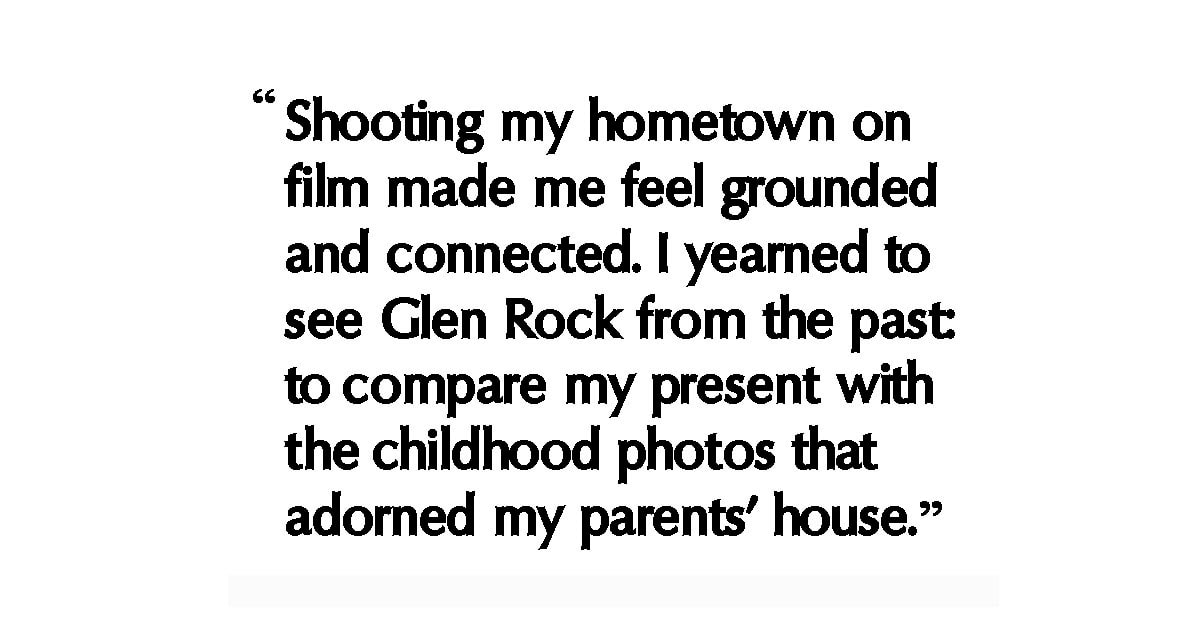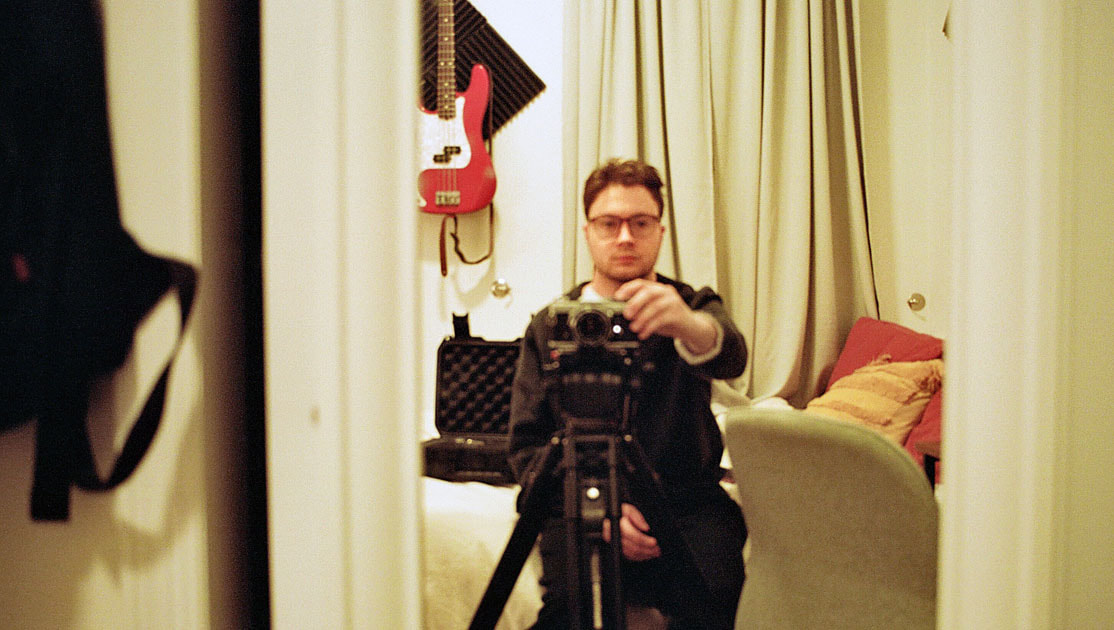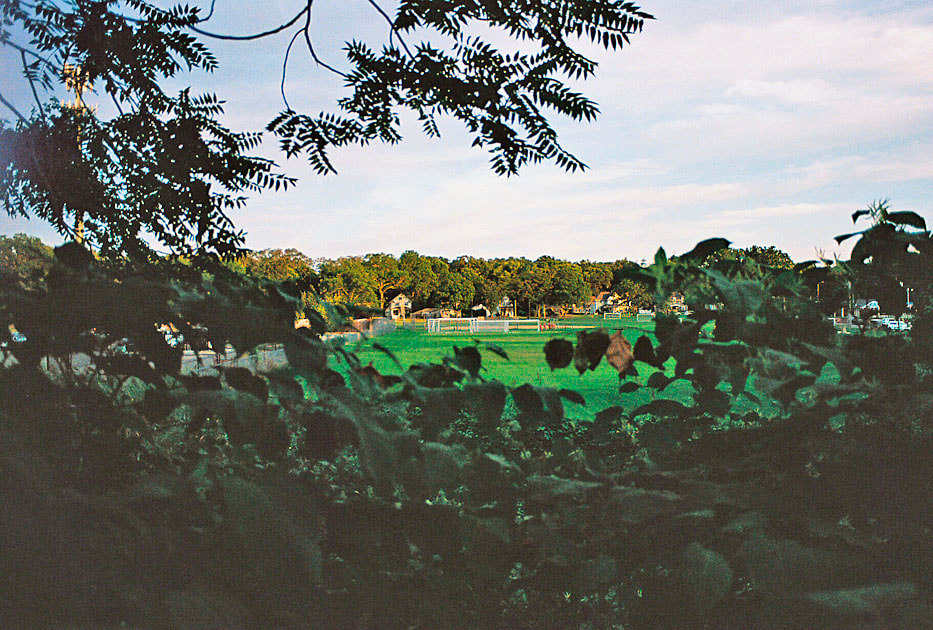Learn more about this series.
COMING HOME
|
Tim Mountain, GRHS Class of 2015, lives in Manhattan. He works in television.
|
|
Struggling to adjust my lens aperture, I fixed it in time to capture a family of deer roaming through the trees, and later, blocking the walkway to take a picture of a tree, I annoyed an elderly couple on a summer stroll.
It was the quarantine summer of 2020, and I was wandering around Thielke Arboretum taking pictures with my newest purchase, a 1970s Olympus SLR camera I’d snagged for a steal on eBay. Having few expenses, I didn’t mind paying for rolls of film and getting them developed – inconveniences that digital photography had long ago corrected for. My favorite photo from that afternoon session was one I took on a small hill overlooking Faber Field. I could see the huge field through the viewfinder of my camera, the foreground obscured by hanging leaves. My dad coached me in tee-ball there. In the moment, shooting my hometown on film made me feel grounded and connected, an archivist of the park’s warm, summer color palette, participating in, in the words of Susan Sontag, its “mortality, vulnerability, [and] mutability.” I yearned to see Glen Rock from the past: to compare my present with the childhood photos that adorned my parents’ house.
I was in the middle of a crisis. Despite the fact that it was woven into my identity, I had started to feel at-odds with the place where I grew up. I had never felt this way before, and I wasn’t sure how to resolve it.
I first noticed the feeling of estrangement in 2021, taking the train to visit my family for Thanksgiving. Before leaving from Penn Station, I asked my friend Kyle if he was heading back to town, forgetting his family had moved out years prior. In the maelstrom of my life at that time, I could hardly keep tabs on who was coming and going, and it was difficult to adjust to a Glen Rock without Kyle in it. I walked past Glen Rock Medical Pharmacy, my first-ever place of employment, and saw its doors shuttered. Walking past the upper tracks, I saw a gaggle of kids skateboarding in the parking lot, reminding me of the countless Saturdays my friends and I spent there, perfecting our heel flips. By the end of the weekend, albeit full of leftovers and love from cousins and grandparents, I was bored: unfulfilled. I had overstayed my welcome and couldn’t wait to get back to New York. The pandemic only compounded the issue. The town was changing; neighbors were moving. Even long-standing businesses shuttered their doors. My friends and I used to wait outside the Dunkin’ Donuts on Rock Road on Friday nights to intercept the surplus donuts (rather disgustingly) on their way to the dumpster. While working on a TV show in Greenpoint, Brooklyn, I learned that one of the producers had recently bought a house in Glen Rock with his wife. He was from Connecticut but had grown to love living in North Jersey, despite his two-hour commute. I felt inadequate in describing how much Glen Rock meant to me.
I couldn’t quite articulate how amazing it was that he was connected to the “population-twelve-thousand snow globe” in which I was raised. “I went to high school there! My parents still live there!” I tried to name families I knew who lived on his street, but most had moved away in the seven years since I’d graduated. I gushed over things most suburban American towns have.
The train! I love taking the train! And the food, the pizza! I’m sure he understood what I was talking about: Glen Rock is a great town. But there was no way for me to beam my feelings, my experience, directly into his heart: Glen Rock is inseparable from my being. Even if I could have, the Glen Rock I knew was not the one in which he now lived.
Even if it hadn’t really changed all that much, it didn’t feel the same. I missed the Glen Rock I knew and loved. At college parties, I spoke of Glen Rock as a glimmering chimera, a Shangri-La. I gushed over the eponymous glacial erratic in the middle of an intersection on Rock Road and over the town’s porous borders, relics of the 19th-century's "Boroughitis" phenomenon, when many towns broke off into smaller towns, due to disputes between farmers and commuters about whether taxes should be increased to develop railroad infrastructure. (giving Bergen County its 70 municipalities with no large cities.)
I positioned myself in relation to the local culture: bands like Titus Andronicus and even Ridgewood’s Real Estate and Spook Houses. I bragged about nearby Paramus, the largest shopping destination in the country, and about growing up in the sediment-filled Newark Basin at the northern end of the Appalachian Piedmont. All of this was to the chagrin of my peers at Fordham, who couldn’t understand why I was so enraptured by a seemingly normal town. Now, living at home in the middle of Covid, Glen Rock didn’t feel as magical as it once had. After I’d moved back to New York, now vaccinated and boosted and readjusting to my “new” neighborhood, I started catching up with home friends I hadn’t seen since the pandemic. Many were in the city, too; some lived only blocks away.
One Friday night, I ended up at my friend Pat’s apartment after working since 5:30 a.m. Deliriously tired by the time I got there, I was half-conscious and tipsy when I left, arm-in-arm with my old friends, belting out Stephen Sondheim lyrics. I’ve had nights like this all over New York City and beyond, and they’re when I feel most at ease. It’s during these nights that I realize the true meaning of home as “not a place but a moment,” as noted by writer Sarah Dessen, and my worries about feeing at-odds with Glen Rock are assuaged. For me, home is also people, and the transactive memory we occupy together. Standing alone in Johnny and Hange’s and hearing the cashier yell back to the kitchen, “one with kraut and mustard!” is one way to feel solace in the place where I grew up. But it is only sitting in my grandma’s kitchen in Florida, reminiscing with her about eating chili cheese dogs and blasting Frank Sinatra in her car, that I am truly at-home, smelling the worn leather interior of her 2007 Mercedes, racing down Maple Ave., the sun setting over the trees. My home, the Glen Rock of my youth, is gone; an ephemeral place I can never visit again, not even through the lens of a vintage camera. But the people who were there with me – and there were a lot – can get me pretty close. 🌭🍩 |






